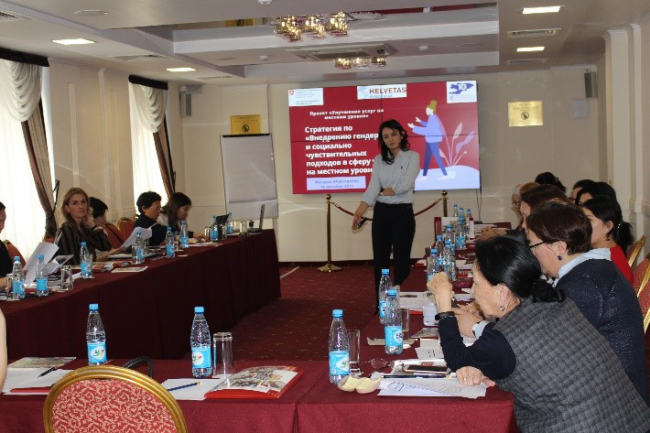- Main page ·
- Press room ·
- News archive ·
- Integration of Socially Inclusive and Gender Responsive Approaches in Public Service Provision at...
Integration of Socially Inclusive and Gender Responsive Approaches in Public Service Provision at the Local Level was discussed

On December 16, 2019 the PSI Project team organized the round table on the “Integration of the Socially Inclusive and Gender Responsive Approaches in the Service Provision at the Local Level”. The event took place at the Park Hotel, Bishkek. Gender specialists from the IOs, representatives of CSOs working in the field of women’s rights and community development along with independent gender experts and the Swiss Embassy`s representatives participated in the round table.
The overall number of participants was 17 people.
The agenda of the round table composed of two sessions. The first session was dedicated to the results of the baseline and the gender-sensitive research of the service provision improvement (clean water supply) in rural areas. The second session included the presentation of gender analysis of the selected municipalities` local strategic documents. The PSI Project’s Strategy was presented and discussed with the invited experts which helped to set up the ground for experience exchange and possible future cooperation.
The preliminary findings of the focus groups conducted in two regions identified the correlation between the drinking water supply service and women’s daily time, health, inter-family relations, children’s lives, personal hygiene and women`s socialization.
Zulfiya Kochorbaeva, the gender expert responsible for the baseline, presented the results of gender analysis of the strategic documents of 40 municipalities. She inferred that almost all strategic documents of the municipalities did not correspond to socially inclusive and gender responsive criteria. However, some of the documents mentioned gender-sensitive issues in their texts. But budget deficits, lack of political will and other factors have prevented the need-oriented service provision for women and disadvantaged groups. The documents were analyzed through the prism of the Guideline developed by the Ministry of Economy in 2015. The Guidance sets up the categorization of local policies based on three indicators: gender-sensitive strategic documents/programmes (3points), institutional mechanism for gender equality (3points), and gender-responsive budgeting (3 points). The proposed evaluation distinguished the following policies: 6 to 9 – gender-positive policy, 3 to 5 – gender-responsive policy, and 0 to 2 – gender-blind policy.
Approximately 59% out of 40 municipalities had gender-responsive policies, having only 1 or 2 indicators at a stake. The research also revealed that, instead of generating new work places, the socially inclusive and gender responsive approaches created additional burden on social workers at the local level.
The PSI project strategy was developed in order to tackle the aforementioned issues. The strategy was designed based on the lessons learnt from project’s phase I, the baseline research and the focus groups with the representatives of the disadvantaged groups. Its main goal aims to facilitate the effective integration of the socially inclusive and gender sensitive approaches in the work of the project municipalities and provide the framework for re-development of local strategic documents, development programmes, and annual local budgets. The PSI project will facilitate the establishment of special working groups for monitoring and evaluation of the implementation of the adjusted documents.
At the end of the round table the participants shared their feedbacks and gave suggestions on the optimization of the project activities. The event was finalized by the agreement to unite the efforts to achieve the common goal.

